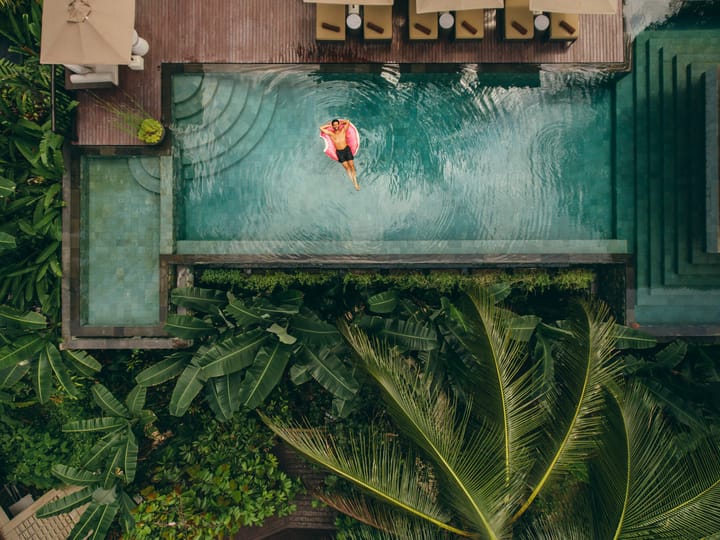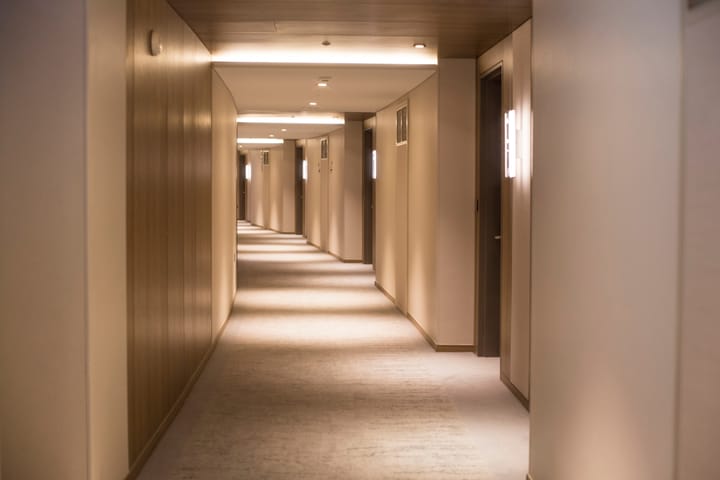Crafting sonic identities
Plus: Bracing for higher costs, slower deals

We’re turning up the volume on guest engagement—literally. From using music to create authentic brand connections to maximizing your outdoor spaces for peak revenue, this week we’ve got insights to help you elevate every touchpoint. Plus, we’re diving into the power of emotional connection as a strategy to turn guests into loyal advocates. Ready to fine-tune your hospitality game? Let’s go!

Long, lazy days await. Spring Break in the South just hits differently. Southern Living, the region’s bible, has a few suggestions for new hotels where you can while away your hours.
Year-round enjoyment. Maximizing usage of your outdoor space is a surefire way to supplement the “P” in the P&L. Weather-proof furniture, seamless indoor-outdoor integration and smart tech for superior sound and entertainment systems can extend seasonal use of your property, much to everyone's delight.
Taking the road less traveled. Jeremy Wells draws on his own experiences as a hotelier and those of fellow industry veterans in this candid look at the unique character and individuality that independent hotels can offer. INDIE HOTEL: Why Hoteliers Are Breaking Free from Chains and Choosing Independence is the book that could provide the push you need to go your own way.
If these walls could talk! Scandals and political intrigue are de rigueur for Washington, D.C.’s Mayflower Hotel, which celebrated turning 100 in February. This three-part podcast explores the history and mystique behind this storied landmark, as well as the significance and impact of historic hotels.
Actionable data at your fingertips. What’s driving ROI for hoteliers in 2025? Are financial pressures really the most looming challenge in the months ahead? These questions and more are answered in Hotel Operations’ State of the Hotel Industry report.

‘Music is the calling card for the soul of the brand’
Bespoke Sound is where deep musical know-how meets savvy hospitality strategy. Founded by Clay Bassford, this sonic identity studio crafts custom soundscapes that bring hospitality brands to life—one perfectly curated note at a time. More than just background music, it’s an immersive experience that lingers with guests long after they’ve checked out. With an all-star client list that includes Auberge Resorts, Hyatt, and Blue Lagoon, Bassford isn’t just setting the mood—he’s shaping the soundtrack of unforgettable stays. -Jennifer Glatt
First of all, what, exactly, is a sonic identity studio?
A sonic identity studio is a creative agency that uses the sense of sound to foster authentic connections between brands and their audiences, and in our case, guiding guests towards the optimal desired brand experience. At Bespoke Sound, we believe music is uniquely powerful in shaping meaningful experiences. Everyone on our team is a musician and/or DJ, so we combine that passion with hospitality know-how to create intentional, tailored sonic environments that consistently reflect a brand's values and vision. We're essentially fractional music directors, helping our clients strengthen connections with culture and the creative community.
How do you work like a branding agency for hotels?
We approach sonic identity with the same strategic rigor as branding agencies approach visual identity. We start by deeply understanding the brand story, guest personas and experiential goals. We create a comprehensive sonic identity guide—similar to brand guidelines—that outlines musical concepts, energy flows and application principles across different spaces and dayparts [certain times of the day]. This ensures that music becomes an integral part of the brand expression rather than just generic, inconsistent or stale background noise.
What's your process for figuring out the sound a brand needs in its space?
Our process begins with immersion in the brands' and guests' worlds. We analyze guest personas, activities on-site, community and cultural context and experiential expectations. And, of course, we experience the properties ourselves to immerse ourselves in the space and atmosphere.
Do guests notice the music, and what is the ROI or impact of a brand that establishes their sonic identity?
Guests absolutely notice music, even if subconsciously. Studies show on-brand music can boost F&B sales by 10% as guests linger longer and spend more. This impact echoes out to every part of the business. Beyond immediate revenue boosts, the right music can make a larger impact than any other experiential element of a brand, directly influencing brand affinity and durability, repeat visits, better reviews and more. As a hospitality brand in today's competitive landscape where many hotels—especially luxury, lifestyle and boutique hotels—must differentiate or die, it's frankly no longer optional to have a definitive and robust music strategy. Fortunately, music and sound are extremely effective and far more flexible investments that return significantly more value than just about anything else a hotelier might consider to solve this challenge.
What role does music play in the guest experience?
Music is the calling card for the soul of the brand, creating an emotional shortcut to the lifestyle a property represents. It's the invisible thread that ties a guest experience together. It signals to guests that they're in a special place that welcomes them, that they speak the same language, that they are safe, belong here and are a part of our tribe. Music enhances mood across different environments, guiding certain activity types, energy levels and social interactions. If we do our job right, it creates these uniquely special, memorable moments that guests cherish long after departure.


Rooftop revival
Modern beachy meets nostalgia in Coronado, Calif., at The Bower—a 39-room boutique gem situated on the grounds of John D. Spreckels’ former Japanese tea garden. “Rooted in the Japanese philosophy of wabi-sabi, the design embraces the beauty of natural imperfection through organic materials and a tranquil aesthetic,” says Hospitality Design associate editor Stephanie Chen. It may be hard to believe, but the hotel’s rooftop bar and restaurant, Dive, is Coronado’s first.
Why it matters: Indie hotels are masterful at finding gaps in the local market and filling them in spectacular ways. With panoramic views from Point Loma to Mexico, Dive is sure to be a favorite waterfront watering hole for guests and locals alike. (Hospitality Design)
Above: The Bower (Courtesy)

Innovation leads to connection
Is your hotel offering thoughtful simplicity and intuitive environments? It should be, according to U.K.-based business consulting group Butterfly. Behavioral, luxury and design trends inform their four resolutions for 2025 that they posit will elevate the guest experience.
Why it matters: Authenticity and inspiration are industry buzzwords, but they get to the heart of the guest journey and ultimately, the connection they form (or not) with your brand. Emotional connection is a strategy and an art form, which builds loyalty and deepens brand love. Bespoke wellness rituals, curated local adventures and experiences that provide a deep sense of place and culture are tried and true ways to get to the heart of travelers. (LinkedIn)

Inventory control = revenue
Reclaiming the guest relationship—and their booking dollars—starts with wrapping your arms around the distribution landscape. Specifically, search. “Hotels need to find the right mix of distribution channels, taking into account factors such as cost of acquisition, reach and control over the guest experience,” notes Brian Reeves, founder and CEO of The roomangel Foundation, a not-for-profit organization dedicated to providing a transparent, collaborative environment for the hospitality industry. In short, direct digital bookings are essential.
Why it matters: How hotels interact with their guests from the get-go can determine where their booking dollars are directed. “One of the key drivers behind intermediaries’ dominance in the travel space is the need for centralized search—a single, convenient place for travelers to compare hotel properties using rich datasets,” Reeves notes. “While hotels prefer bookings via their direct brand channels, they have struggled to attract end consumers who prioritize choice… With guests demanding seamless booking, customer-centric centralized search for direct bookings becomes mission-critical.” (Hotel Technology News)

Trump’s tariffs and the cost to hotel investors
Limited funds availability plus the spectre of higher loan costs due to tariffs is a “crazy storm,” says Alan Benjamin, founder and president of Denver-based global procurement company Benjamin West. “I’ve never seen so much need for CapEx, so little funds for CapEx.” Construction, manufacturing and importing costs and more are at risk.
Why it matters: Hotels should brace for higher costs and slower deals, and be prepared to take a hard look at their supply chains. According to PwC’s most recent executive Pulse Survey from October, prior to the presidential election, 75% of respondents said they agree or strongly agree that a 10% universal tariff on imports would significantly hinder their growth. (Hotel Investment Today)
💯 Enjoying Mint Pillow? Share it with a friend.
👋 Have a story idea or want to say hello? Email us at newsletter@mintpillow.co




